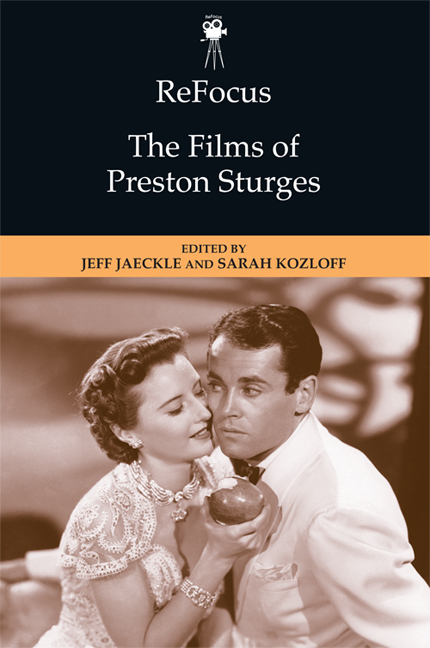Book contents
- Frontmatter
- Contents
- List of Figures
- Notes on Contributors
- Introduction: An Agile Mind—The Many Stands of Preston Sturges
- Part 1 Contexts: Genre, Studio, Authorship
- Part 2 Cultural Commentary: History and Identity
- 5 Sturges's Many Mothers
- 6 “These Are Troublous Times”: Social Class in the Comedies of Preston Sturges
- 7 “They Always Get the Best of You Somehow”: Preston Sturges in Black and White
- 8 Falling Hard: The Sin of Harold Diddlebock
- Part 3 Technique: Scripting, Performance, Music
- Part 4 Impact: Reception/Reputation
- Index
8 - Falling Hard: The Sin of Harold Diddlebock
from Part 2 - Cultural Commentary: History and Identity
Published online by Cambridge University Press: 05 September 2016
- Frontmatter
- Contents
- List of Figures
- Notes on Contributors
- Introduction: An Agile Mind—The Many Stands of Preston Sturges
- Part 1 Contexts: Genre, Studio, Authorship
- Part 2 Cultural Commentary: History and Identity
- 5 Sturges's Many Mothers
- 6 “These Are Troublous Times”: Social Class in the Comedies of Preston Sturges
- 7 “They Always Get the Best of You Somehow”: Preston Sturges in Black and White
- 8 Falling Hard: The Sin of Harold Diddlebock
- Part 3 Technique: Scripting, Performance, Music
- Part 4 Impact: Reception/Reputation
- Index
Summary
A STRANGE EPIPHANY
The Sin of Harold Diddlebock (1947) occupies an uncertain position in the filmography of Preston Sturges. It was the first and, as it turned out, last film he made as an independent producer after leaving Paramount, the studio where, between 1940 and 1944, his reputation as a writer-director was established. In 1944, Sturges and Howard Hughes formed California Pictures, an early example of the move toward independent production then being made by directors who had previously worked within the Hollywood studio system. But 1944 would also be the year Paramount released two of Sturges's biggest commercial successes, The Miracle of Morgan's Creek (which opened in January but was filmed two years earlier) and Hail the Conquering Hero (which opened early in August). Late in August 1944, however, Paramount finally released The Great Moment, an important project for Sturges and, like Miracle, shot two years earlier. The Miracle of Morgan's Creek was, in spite of the enormous challenges it presented in terms of the dictates of the Hays Code (which were largely responsible for delaying the film's release), eventually shown in a version close to Sturges's intentions. The Great Moment, on the other hand, was significantly recut by the studio's head of production, B. G. De Sylva, a decision on De Sylva's part that was central in Sturges leaving Paramount. The Great Moment, a departure for Sturges, was a major critical and commercial disappointment. Diddlebock, which began shooting in September 1945, promised far greater control for Sturges and, consequently, the possibility of a return to critical and popular favor. But it, too, faced post-production problems, as well as an enormously protracted shooting schedule brought on by the comparative freedom Sturges was now luxuriating in as his own producer. Tentatively released two years later in Miami, Portland, and San Francisco to good reviews, the film was soon withdrawn by a dissatisfied Hughes and held up for three years, recut by him, and released in 1950 as Mad Wednesday. It, too, was a financial failure. In the years between Diddlebock and Mad Wednesday, Sturges signed a contract with Twentieth Century-Fox, where he made Unfaithfully Yours (1948) and The Beautiful Blonde from Bashful Bend (1949).
- Type
- Chapter
- Information
- ReFocus: The Films of Preston Sturges , pp. 173 - 190Publisher: Edinburgh University PressPrint publication year: 2015



